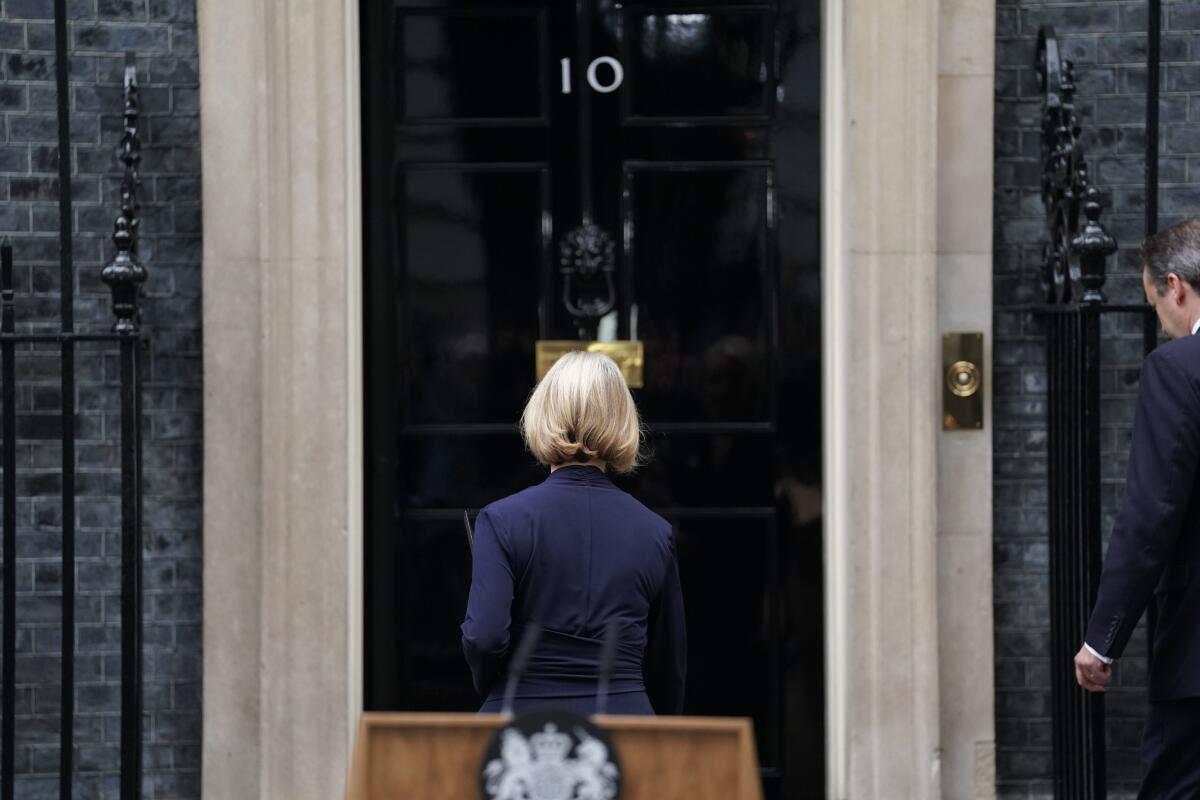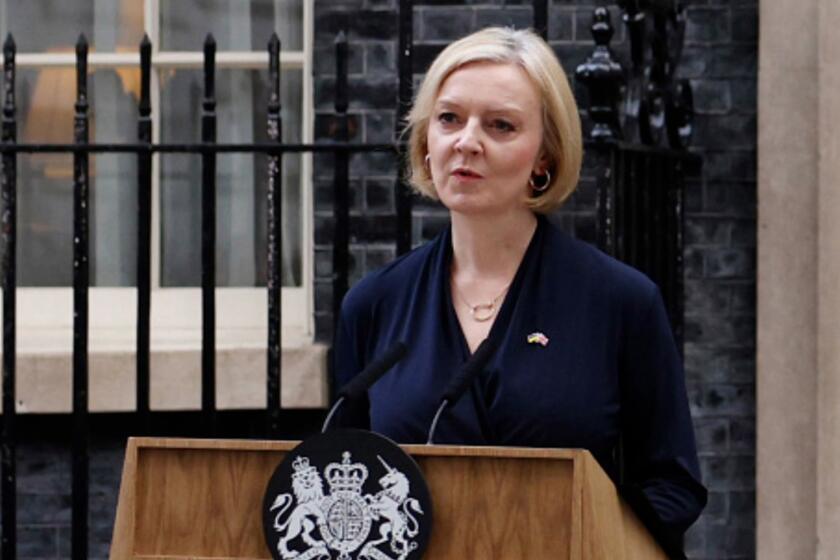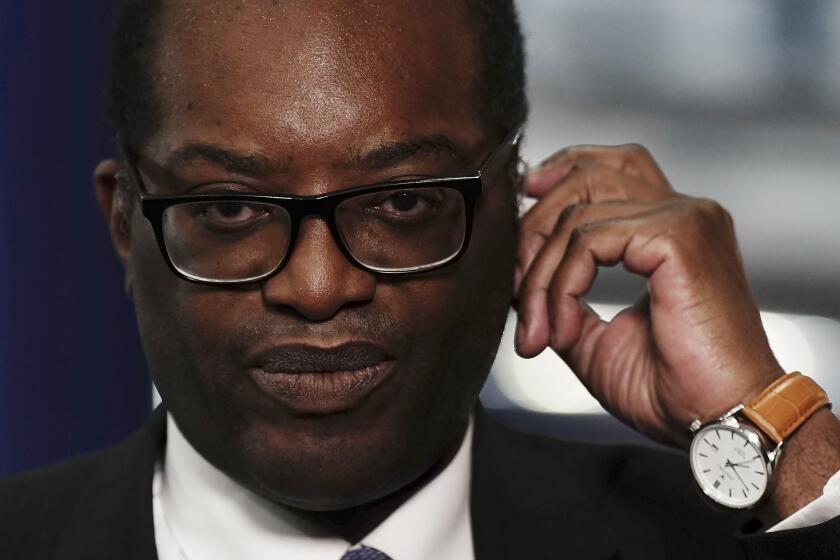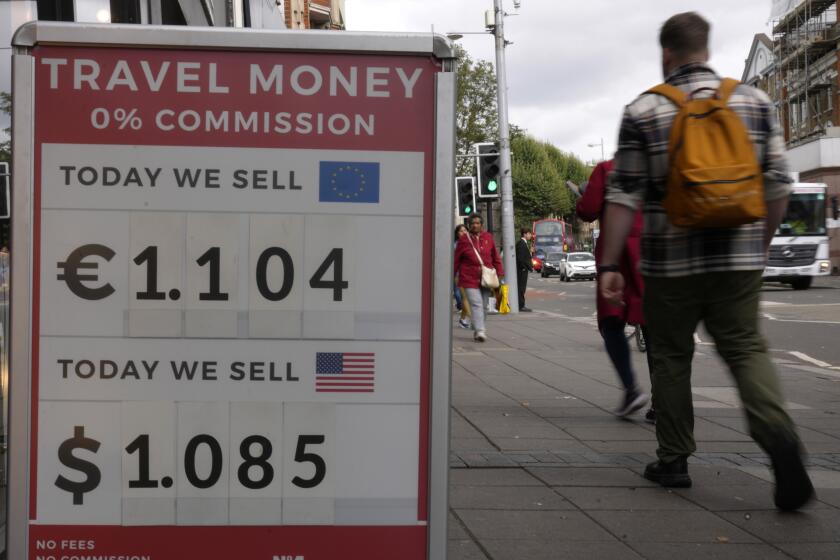With another prime minister gone, what’s next for an already diminished Britain?

- Share via
LONDON — Double-digit inflation. A weakened British pound that’s hovered near parity with the dollar. Soaring energy costs. The death of a revered monarch.
And now, the prospect of a third prime minister in less than three months.
Even before the spectacular political flameout of Prime Minister Liz Truss, Britain of late has often seemed like a country unsure of its place in the world: a medium-sized power, its empire long gone, teetering on the edge of becoming a small, isolated island, battered by storms within and without.
Truss’ tenure was so short — just 44 days — that her successor will face essentially the same array of problems she started with: a restive Scotland, where breakaway sentiment could again flare; the damaging longer-term economic ramifications of Brexit, which took effect in 2020; a social safety net and health service frayed by years of austerity; mixed sentiment about the royal family, now led by the less popular King Charles III.
And this web of woe comes against the backdrop of a war in Ukraine that has come to represent Russian President Vladimir Putin’s stark challenge to a rules-based postwar security order in which Britain was once a powerful player.
The move comes after a tumultuous six-week term in which her policies triggered turmoil in financial markets and a rebellion in her party obliterated her authority.
Truss’ resignation on Thursday was one more jolt in a succession of upheavals that have left the United Kingdom groping for some semblance of unity. This year has seen governments upended, protesters in the streets over worsening cost-of-living struggles, and the loss of a national symbol, Queen Elizabeth II, who died last month at 96.
Truss’ Conservative Party turned against her after her proposals to cut tens of billions of dollars in taxes without plans to recoup the funds sent the economy tumbling. She said Thursday that she could not “deliver the mandate on which I was elected.”
It was a nicer way of saying what many in her own party, and certainly those outside it, had come to agree on, said Matthew Goodwin, a politics professor at the University of Kent.
“Liz Truss goes down in history as the shortest-serving prime minister having held the office and the worst prime minister in our country’s history,” he said.
Party members will vote Oct. 28 on a replacement. The likely candidates include a who’s who of names from current and prior government administrations, including former Treasury chief Rishi Sunak, whom Truss beat out for the top job in September. Boris Johnson, the rumpled, brazen former prime minister whose July resignation under scandal paved the way for Truss, is also eligible to hop back into the fray, though it’s considered unlikely.
The new leader in this nation of 63 million, one of the richest and most populous in Europe, is expected to be in place by Oct. 31.
Britons have grown accustomed to near-constant governmental and economic crises since the country narrowly voted six years ago to exit the European Union. In that interval, there have been four prime ministers — each having resigned — with a fifth on the way.
The British government has dropped plans to cut income tax for top earners after defending the proposal for days.
All have been from the Conservative Party, whose long-standing majority in Parliament has given it the ability to choose one leader after the next.
Polls suggest that the party would lose if a general election to decide parliamentary seats were held today, prompting activists to call for such a vote ahead of schedule. The next one is not due until 2025. The last one was in 2019.
Voters are clearly fed up.
“We’re the nation of Winston Churchill and Margaret Thatcher,” said Sanmeet Singh, a tech worker who was out to eat in East London on Thursday when the news alerts of the resignation flashed across his phone. “Now we have this clown car of a government, a parade of dunces.”
“Who knows what nightmare Halloween will bring?” he said. “I used to be proud of our country no matter the party in power. Now I am embarrassed.”
Jeffrey Sheffield, a friend of Singh’s who joined him, felt similarly. “We’ve always been this place people look up to,” he said. “But we can’t even keep a government together for a few months? We’re more like a developing nation than anything close to an established, functioning one. Indeed embarrassing.”
It’s a word that’s been thrown about a lot in Britain these days, a place that has recently excelled at setting records that few nations would envy.
Inflation hit 10.1% in September, a high last reached 40 years ago. The same month, the pound, historically one of the world’s strongest currencies, dropped to the point it was near equal with the dollar. It’s barely recovered.
Britain is the only nation in the Group of 7 industrialized democracies whose economy has not bounced back to pre-pandemic levels.
A stumbling British pound and surging U.S. dollar have left Brits feeling glum and plenty of Americans feeling gleeful.
The new government faces a dark winter of battling an energy crisis brought on by the war in Ukraine. The company that manages the gas and power system in the U.K. has warned of possible blackouts as a result of Russian energy blockades rippling across Europe.
Even Britain’s pubs, a beloved national institution, warn that dramatically rising power bills might lead some to ring the closing bell.
The monarchy, long shored up by abiding national affection for Elizabeth, has struggled to regain its footing following her death after 70 years on the throne. Many younger Britons say they see little point in carrying on with centuries of royal traditions.
All this has added up to a sense of deep uncertainty.
“The British system prides itself on stability,” said Victoria Honeyman, a politics professor at the University of Leeds. “It has been tested to destruction in the last few years, and this year it’s upheaval after upheaval.”
Goodwin agreed, saying the country has “lost its prestige of being a leader of consistency, a model of predictable, consensual moderate politics.”
But among Western peer nations, Britain’s political angst hardly makes it an outlier.
“France is in gridlock. Italy is politically imploding. Populists are running wild in Sweden,” Goodwin said, pointing out that the United States — with looming midterm elections, the Jan. 6 hearings and the Republican Party dominated by supporters of former President Trump, including many election deniers — is hardly “stable and tranquil.”
At the least, the drama unfolding at the prime minister’s official residence of 10 Downing St. has provided plenty of fodder for meme makers, pundits and online wags.
Truss “lasted 4.1 Scaramuccis,” Anthony Scaramucci, the former White House communications director best known for being fired by Trump after only 10 days, tweeted Thursday.
In London, the Daily Star tabloid started a YouTube livestream last week that displayed a framed photo of the British leader next to a blond wig on a head of lettuce, captioned: “Will Liz Truss still be prime minister within the 10 day shelf-life of a lettuce?”
At 1:37 p.m. London time on Thursday, as an audience of 20,000 people watched the livestream, a hand appeared in the frame, turning the portrait facedown. A bottle of prosecco bubbly and a glass materialized — all to strains of the new national anthem, “God Save the King.”
The lettuce, at seven days, had won out.
More to Read
Sign up for Essential California
The most important California stories and recommendations in your inbox every morning.
You may occasionally receive promotional content from the Los Angeles Times.














